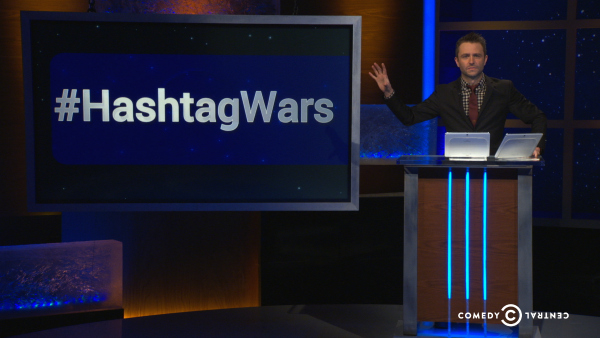An article in the Financial Times seems to speak in no uncertain terms about social media’s inability to generate ratings for television shows, despite both Twitter and Facebook fighting for the right to claim each does it better:
The two social networks have spent the past year trumpeting a virtuous cycle between people watching television and using social media. But, in spite of the buzz, NBCUniversal’s head of research Alan Wurtzel says that social media “is not a game changer yet” in influencing television viewing.
Peter Kafka at Re/Code puts an even finer point on Wurtzel’s views:
He comes to that conclusion after looking at the effect of Twitter, as well as Facebook, on NBCU’s ratings during the Winter Olympics. Wurtzel saw lots of chatter about Sochi on social media, but none of that seemed to translate to increased viewership.
There are a number of reasons why using the Olympics as a yardstick isn’t the best idea. Again, from the Financial Times piece:
Ad executives cautioned that the results could be skewed by the fact that the Olympics draws mass audiences who are likely to tune in regardless of social media buzz.
More niche programming, such as dramas or reality television programmes, could show more correlations between social media activity and viewership, says Kate Sirkin, global research director at Publicis’ Starcom MediaVest Group, which last year committed to hundreds of millions of dollars of advertising spend on Twitter over several years.
Other questions I had that I’d research if I had more time:
- What are the typical demographics of the Olympics and how do they compare to the average user of Twitter and Facebook?
- Did NBC utilize its social media channels to encourage viewers to tune in for its broadcasts? Was there a specific call to action? Were they conversational? Or did the tweets read more like a print ad?
- How many “luge” jokes were made on Twitter during the Olympics? (This is less about the topic at-hand and more because I have the sense of humor of a child.)
Wurtzel’s is a voice worth listening to as he’s had a long career in television with many years in research. And he’s not exactly been against new media as a way to drive eyeballs to traditional TV, specifically for the Olympics:
But Alan Wurtzel, president of research and media development for NBCU, said in separate remarks that new media seemed to have the opposite effect: The more live video people saw of the games taking place in real-time, the more interested they were in seeing curated primetime telecasts that included more information about the athletes, their background and the stories behind their journey to the event.
Still, as Re/Code and Financial Times both point out, there are plenty of studies that suggest a correlation between ratings and social media chatter. And yesterday Twitter CEO Dick Costolo had a specific response to Wurtzel’s position.
But mostly I’m stunned we’re still thinking of social media purely in terms of eyeballs and sales. Especially since not all marketing tactics/channels are expected to have a direct relationship to them. NBC/Wurtzel certainly seems to view social media as such without considering things like awareness, consideration, brand education, etc.
Also, there are so many smarter uses of social media and TV that are less about seeing the audience as contributing to ratings and more about the audience contributing to the experience of watching the show. That should be the model for social’s role in television viewing.
Case studies in the smart use of TV and social media are easy to find. Scandal is the example cited most often about the blurring of lines between content creators and audience, but this Fast Company article from 2010 shows Twitter’s been driving live-TV viewing conversation long before Olivia Pope had her first wine-and-popcorn dinner. AMC creates ongoing feedback loops with many of its shows, like The Walking Dead which uses Facebook-only games, apps and other social tactics to drive so much conversation that it even launched its own show-about-the-show, Talking Dead with host Chris Hardwick.
Now Hardwick’s taken social TV to the next level with @Midnight, a show I’d slept on until a co-worker hipped me to it. As someone who’s hyper-involved with social media, I was instantly hooked on its hashtag-driven format. Less a game show than a gathering of your funniest, geekiest friends in a game of one-upsmanship, it starts with the premise that the best humor is off-the-cuff and in-the-moment, just like most Twitter humor. It’s the only game where a round of play would be based on user anger over Google Plus’s as the new YouTube commenting platform. (Warning: May be NSFW depending on your workplace and access to headphones.)
Key to the show’s success is the audience playing along on Twitter. Splitsider sums it up:
That’s because of the popular #HashtagWars segment, which lasts just 60 seconds on the show but goes on for hours and hours on Twitter as thousands of would-be comedians try to get their tweet featured on the next episode, or at least make the top 10 on the show’s Tumblr.
This kind of audience participation goes beyond the rote “Tell us what you think!” call to action from a newscast or even a tweet-powered ticker along the bottom of the screen. It’s like a whole parallel segment of the show that’s tied to, but not dependent on, what’s happening on-screen. Like any other Twitter hashtag, you don’t need to know how it started to participate. Not forcing the tune-in action allows awareness and consideration of @midnight in real-time even for those that cut the cable cord and can’t access what everyone else is seeing. And it might also explain @midnight’s ratings success and renewal.
Making complementary content the goal of its social media channel – as opposed to ratings – has made @midnight a success. If NBC and the 2016 Olympics can achieve that maybe they’ll see ratings increases, too.
